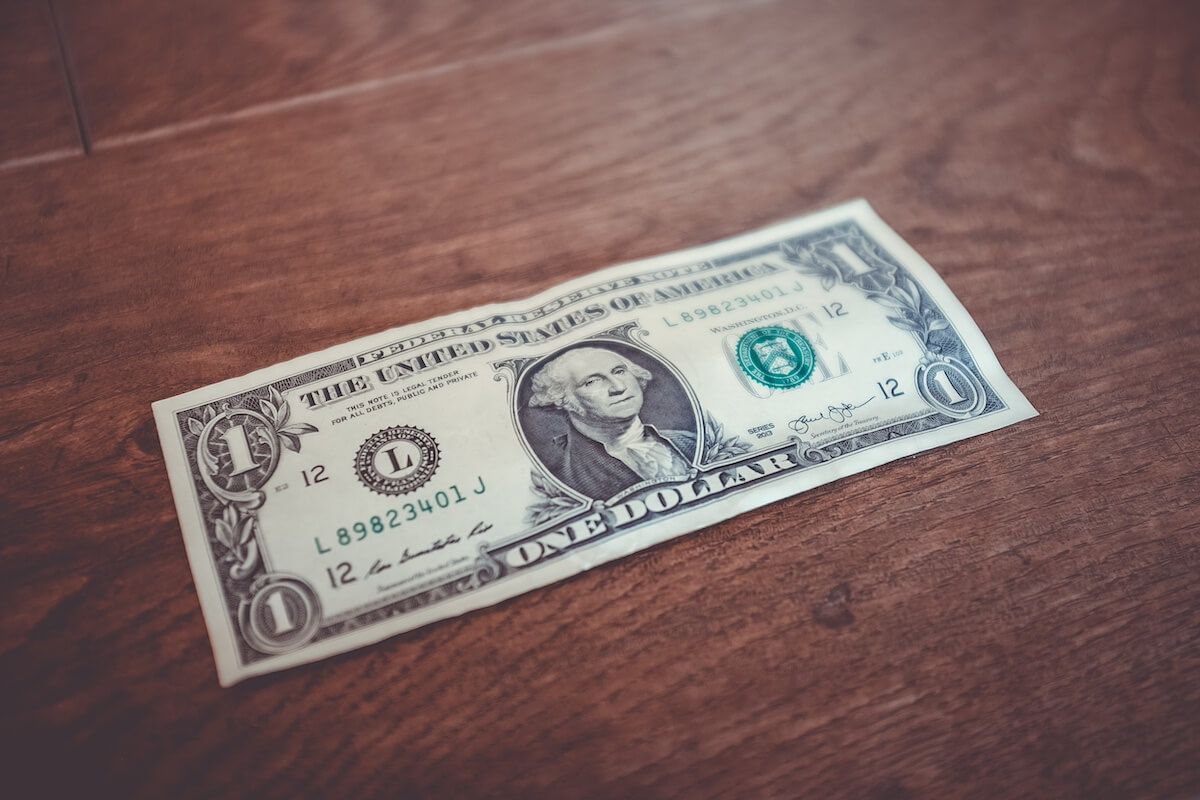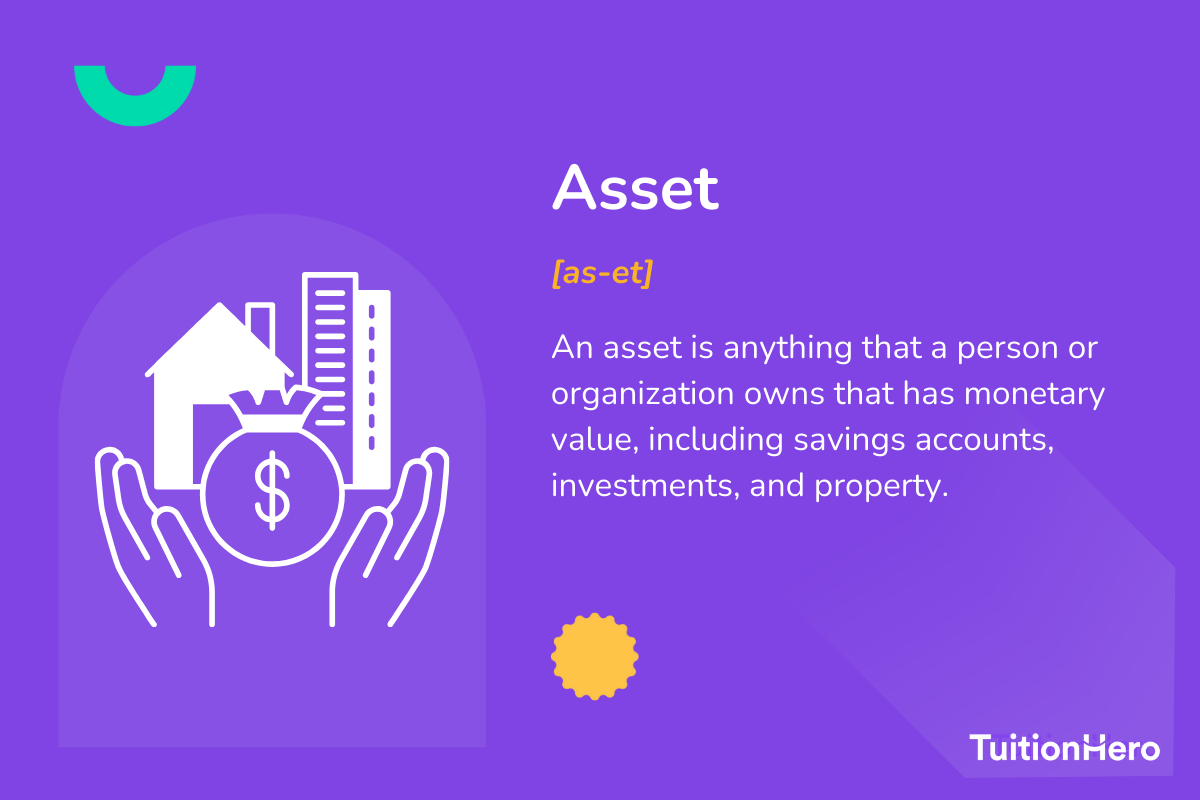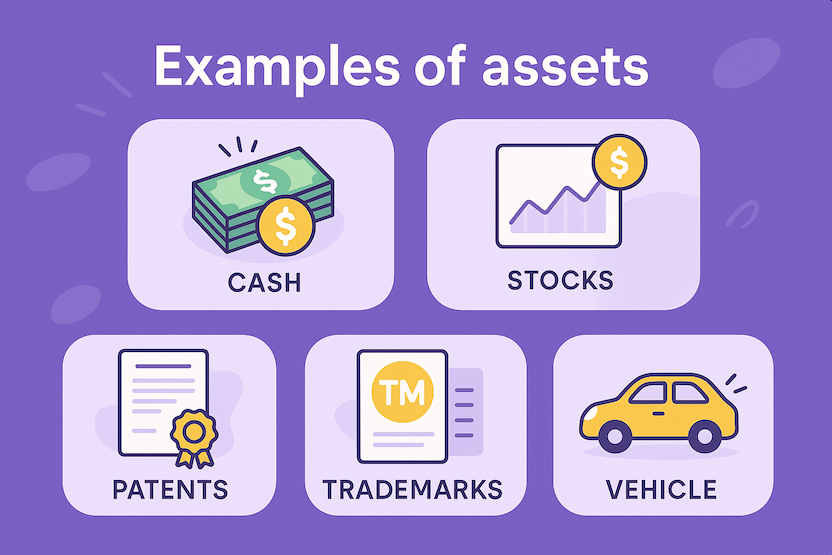Advertiser Disclosure
Last update: June 6, 2025
9 minutes read
What is an Asset? Beginner’s Guide to Finance in 2025
Discover what assets are in economics, explore key types—from tangible to intangible—and learn how they shape personal and business financial health. Read more!

By Brian Flaherty, B.A. Economics
Edited by Rachel Lauren, B.A. in Business and Political Economy
Learn more about our editorial standards



By Brian Flaherty, B.A. Economics
Edited by Rachel Lauren, B.A. in Business and Political Economy
Learn more about our editorial standards
If you’ve ever wondered what are assets in finance, or questioned the use of assets beyond simple bookkeeping, you’re in the right place.
Understanding assets goes beyond simply knowing what you own today—it’s about uncovering their true value and managing them so they work harder for you tomorrow.
In this post, we’ll explore two critical areas that often get overlooked in beginner guides: how to value assets more accurately and how to put proactive management practices in place. Master these strategies, and you’ll turn your balance sheet into a powerful tool for growth and resilience.

Key takeaways
- Assets play a pivotal role in determining your net worth
- Your net worth reflects the balance between your assets and liabilities
- Investing in intangible assets can offer growth potential but comes with its set of challenges
What makes something an asset?
At its core, an asset is a thing that holds economic value and is expected to bring in future financial benefits. These financial benefits can include price appreciation, cash flows, savings on expenses, or increased sales.
However, just because something makes you money, doesn’t necessarily make it an asset. Labor, for example, is not an asset.
In economic terms, Labor is distinct from assets as it involves work performed by human beings rather than machines or businesses. Assets usually involve value conferred from objects or entities.
Or how about your college degree? It's hard to consider it an asset since it may help you get a job, but there are no guarantees.
Additionally, an asset should be owned or controlled by the individual or entity, not just used. For instance, renting a property generates income, but ownership of the property itself is considered an asset.

How do I identify an asset?
If you're looking at something and wondering if it's an asset, ask yourself:
- Does it have economic value?
- Can it give me some future benefits?
If the answer is "yes," congrats, you're looking at an asset! Consider evaluating the asset's liquidity, its potential for appreciation or depreciation, and any associated costs or maintenance needed to maintain its value.
Does having assets make me wealthy?
Well, not exactly. Having a ton of assets is like having a garage full of fancy cars.
Impressive? Sure. But if you paid for them using debt, they might not equal wealth.
So, while assets boost your net worth, the debt also increases your liabilities. You can see the real picture when you balance assets (things you own) with liabilities (things you owe).
Your net worth is actually equal to all of your assets (cash, property, investments, valuables) minus your liabilities (debt). And remember, it's not just about quantity, but also quality.
Diversifying your assets across different categories—like real estate, stocks, bonds, and digital assets—can help mitigate risks and enhance your overall financial stability.
Some assets, like investments or real estate, can grow in value over time. Others, like that fancy car, will usually lose value as you drive it (unless it’s a vintage collectible).
Assets vs. liabilities
Understanding the differences between assets and liabilities is fundamental to understanding the financial position of a business or person. These terms are core components of any balance sheet and can significantly affect your economic health.
Assets refer to resources owned or controlled by a company or individual that are expected to produce economic value in the future (something you own with future value).
Liabilities, on the other hand, represent obligations that require an outflow of resources to settle (something you owe).
That being said, liabilities aren’t necessarily a bad thing - sometimes debt is required to purchase large assets, like a home or heavy machinery. As long as you derive a sufficient benefit from using the asset and can afford the interest payments, you’re in the green.
The table below elucidates the key distinctions between assets and liabilities.
Attributes | Assets | Liabilities |
|---|---|---|
Definition | Resources owned or controlled by an entity are expected to generate future economic benefits. | Obligations that require an entity to sacrifice resources in the future to settle. |
Nature | Positive, adds value to the entity. | Negative, represent claims against the entity's assets. |
Impact on Equity | Increases equity as it brings value. | Reduces equity as they signify obligations. |
Financial Statement | Listed on the left-hand side of the balance sheet. | Listed on the right-hand side of the balance sheet. |
Examples | Cash, Accounts Receivable, Inventory, Land, Machinery, Buildings | Accounts Payable, Bank Loans, Mortgages, Employee Benefits |
Valuation | Generally valued at cost or fair market value. | Generally valued at the amount expected to be paid to settle the obligation. |
Liquidity | Can be liquid (easily convertible to cash) or non-liquid (not easily convertible). | Short-term (due within one year) or long-term (due after more than one year). |
Effect on Cash Flow | Can generate inflow of cash or other economic benefits. | Usually result in outflow of cash or other resources. |
Tax Implications | May be depreciated or amortized, which can offer tax benefits. | Interest payments on certain liabilities may be tax-deductible. |
Caption: The table compares and contrasts assets and liabilities based on various attributes like definition, nature, impact on equity, financial statement placement, examples, valuation, liquidity, effect on cash flow, and tax implications.

Are all assets the same?
There are many types of assets. Let's break it down:
- Current assets: These assets are usually expected to be consumed within a year or are highly liquid. Examples include:
- Cash and its buddies (like Treasury bonds)
- Accounts receivable (money others owe you)
- Inventory (stuff you'll sell soon)
- Prepaid expenses (things you've paid for in advance, like utilities).
- Fixed assets: These are your long-term pals, sticking around for over a year. Examples include:
- Equipment
- Factories
- Buildings. But here's the kicker: as they age, their value can decrease, the same way cars lose value over time. This decrease is called depreciation. And trust me, there's a whole world of methods to calculate it. We'll leave that for another day.
- Financial assets: These are like your fantasy football picks. You're investing in other entities, betting on their success. They range from stocks and bonds to more complex securities.
- Intangible assets: The phantom assets! You can't touch 'em, but they're invaluable. Examples include:
- Patents
- Trademarks
Compare private student loans now
TuitionHero simplifies your student loan decision, with multiple top loans side-by-side.
Compare Rates
Advanced asset valuation methods
Before diving into methods, you might ask, "Is a loan an asset?" We cover alternative valuation approaches that reveal a truer picture of an asset’s economic worth—and surface SEO-friendly terms like “fair value” and “mark-to-market.”
- Market approach: Relies on quoted prices for identical or very similar assets. Ideal for publicly traded securities, it reflects what willing buyers and sellers are actually trading at today.
- Income approach: Discounts an asset’s expected future cash flows back to present value. Common for rental properties, patents, or any asset that delivers a steady revenue stream.
- Cost approach: Estimates what it would cost to replace the asset new, then subtracts accumulated depreciation. Useful when market or income data are sparse—think specialized machinery. Consider carefully what is included in assets when choosing a method.
You can blend these methods or follow the Level 1/2/3 input hierarchy under IFRS 13 to handle everything from liquid securities (Level 1) to hard-to-value intangibles (Level 3).
Advantages and disadvantages of investing in intangible assets
In the vibrant world of assets, intangible ones have always been a topic of heated debates. These phantom assets, like patents, copyrights, and brand recognition, have their benefits and pitfalls.
- Growth potential: Intangible assets, especially intellectual property, can skyrocket in value if they become widely recognized or used.
- Competitive edge: They can give businesses a unique edge over competitors.
- Brand loyalty: Trademarks and brand recognition can create loyal customer bases.
- Licensing opportunities: Patents and copyrights can be licensed out, creating a steady stream of revenue.
- Valuation difficulties: Determining the exact value of intangible assets can be, well, intangible.
- Expiration dates: Some intangible assets, like patents, have a shelf life. For example, drug patents last 20 years, after which other companies can create generic, cheaper copies.
- Reputation risks: A brand's value can plummet with bad PR or negative public perception.
- High initial costs: Developing or acquiring intangible assets can be pricey.
Best practices for proactive asset management
Expanding into broader contexts, what are assets in economics and how do they differ from everyday items?
Also, understanding what are student assets can empower financial decisions for younger demographics. Tracking assets is half the battle.
To maximize uptime and control costs, adopt these four pillars:
- Use enterprise asset management (EAM) software: Implement a centralized system to log maintenance schedules, warranty data, and compliance checks in real time.
- Run annual impairment tests: For goodwill and other intangibles, test for declines in recoverable value each year—or sooner if market conditions shift.
- Revalue fixed assets periodically: In inflationary climates, schedule revaluations to uncover hidden equity and ensure accurate insurance coverage.
- Leverage IoT & automation: Fit critical machinery with sensors (vibration, temperature) to forecast failures and trigger work orders before breakdowns occur.

Why trust TuitionHero
Here's the inside scoop on jump-starting your financial journey with TuitionHero. We're not just about the numbers; we future-proof your education and finances. We're here to help you maximize your educational assets, whether you're looking for private student loans, refinancing, or navigating scholarships and FAFSA. Think of TuitionHero as your co-pilot on this exciting financial journey.
Banks under pressure: $500 billion in unrealized securities losses
As of December 31, 2024, U.S. banks held $482.4 billion in unrealized losses on held-to-maturity and available-for-sale securities—up $118.4 billion (33%) from the prior quarter—driven by rising long-term interest rates.
Experts warn these paper losses could strain liquidity and revive SVB-style market jitters unless fair-value revaluations and proactive asset management (impairment testing, dynamic hedging) become standard practice.
Analysis shows several regional banks’ unrealized losses may exceed their tangible equity, highlighting the critical need for stronger capital buffers and real-time portfolio monitoring via advanced EAM platforms.
Frequently asked questions (FAQ)
An asset is anything of value or a resource of value that can be converted into cash. Assets are owned by individuals, companies, or governments and are expected to provide future economic benefits. This includes things like cash, real estate, investments, machinery, inventory, or anything else that holds value.
Assets can be categorized mainly into two types: tangible and intangible. Tangible assets are physical and measurable items like buildings, vehicles, and equipment.
Intangible assets, on the other hand, are non-physical and include things like patents, trademarks, and copyrights.
Additionally, assets can be classified as current (short-term) and non-current (long-term) based on their liquidity or how easily they can be converted into cash.
In both business and personal finance, assets are crucial because they hold value and can be used to generate income or provide financial security.
For businesses, assets are important for day-to-day operations, for securing loans, and for long-term growth and investment. In personal finance, assets contribute to an individual's net worth and financial stability, serving as a foundation for future wealth accumulation or as security against financial emergencies.
A student loan is a liability for the borrower because it represents money you owe and must repay over time. However, on a lender’s books it’s recorded as an asset since the lender expects to receive future payments with interest.
Some examples of assets include:
- Tangible assets: Cash, inventory, machinery, buildings, vehicles
- Financial assets: Stocks, bonds, bank deposits
- Intangible assets: Patents, trademarks, copyrights, goodwill
- Natural assets: Mineral deposits, forests, water rights
- Human capital: Skills, education, experience of employee
An explanation that can help a child understand assets can look like:
Imagine you have a toy that you can sell or trade for money, or a lemonade stand that gives you coins every day. Those toys and that stand are assets because they help you get something valuable later—like ice cream or new toys.”
Final thoughts
By applying advanced valuation techniques and embedding proactive management into your processes, you’ll not only present stronger financial statements but also extend the life and performance of your assets.
Whether you’re analyzing retail portfolios or managing what are assets of a bank, embedding these practices will shape your strategic edge in assets in banking and beyond. Start integrating them today—and watch your financial foundation grow more solid with each decision.
Sources
Author

Brian Flaherty
Brian is a graduate of the University of Virginia where he earned a B.A. in Economics. After graduation, Brian spent four years working at a wealth management firm advising high-net-worth investors and institutions. During his time there, he passed the rigorous Series 65 exam and rose to a high-level strategy position.
Editor

Rachel Lauren
Rachel Lauren is the co-founder and COO of Debbie, a tech startup that offers an app to help people pay off their credit card debt for good through rewards and behavioral psychology. She was previously a venture capital investor at BDMI, as well as an equity research analyst at Credit Suisse.
At TuitionHero, we're not just passionate about our work - we take immense pride in it. Our dedicated team of writers diligently follows strict editorial standards, ensuring that every piece of content we publish is accurate, current, and highly valuable. We don't just strive for quality; we aim for excellence.
Related posts
While you're at it, here are some other college finance-related blog posts you might be interested in.
Shop and compare student financing options - 100% free!

Always free, always fast
TuitionHero is 100% free to use. Here, you can instantly view and compare multiple top lenders side-by-side.

Won’t affect credit score
Don’t worry – checking your rates with TuitionHero never impacts your credit score!

Safe and secure
We take your information's security seriously. We apply industry best practices to ensure your data is safe.
Finished scrolling? Start saving & find your private student loan rate today
Compare Personalized Rates


